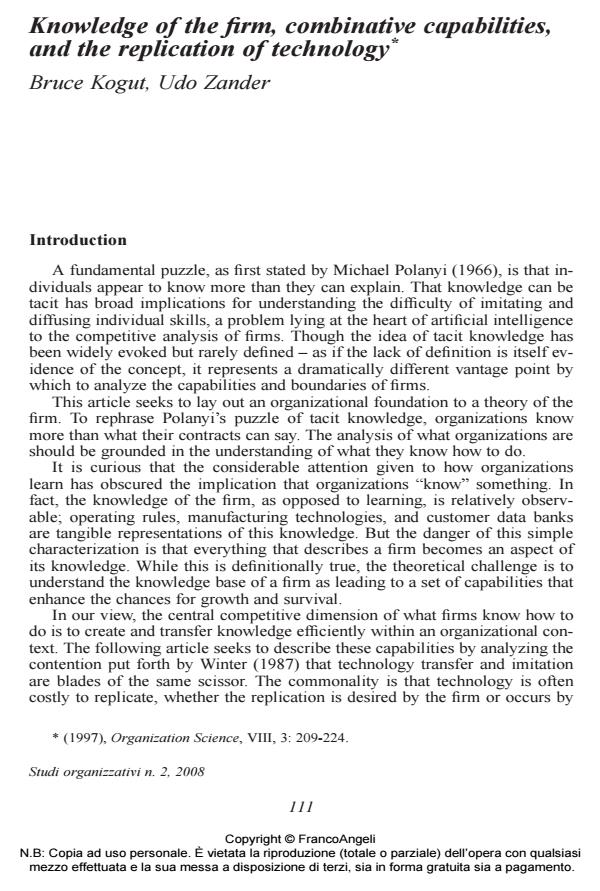Knowledge of the firm, combinative capabilities, and the replication of technology
Titolo Rivista STUDI ORGANIZZATIVI
Autori/Curatori Bruce Kogut, Udo Zander
Anno di pubblicazione 2009 Fascicolo 2008/2
Lingua Inglese Numero pagine 0 P. Dimensione file 454 KB
DOI 10.3280/SO2008-002005
Il DOI è il codice a barre della proprietà intellettuale: per saperne di più
clicca qui
Qui sotto puoi vedere in anteprima la prima pagina di questo articolo.
Se questo articolo ti interessa, lo puoi acquistare (e scaricare in formato pdf) seguendo le facili indicazioni per acquistare il download credit. Acquista Download Credits per scaricare questo Articolo in formato PDF

FrancoAngeli è membro della Publishers International Linking Association, Inc (PILA), associazione indipendente e non profit per facilitare (attraverso i servizi tecnologici implementati da CrossRef.org) l’accesso degli studiosi ai contenuti digitali nelle pubblicazioni professionali e scientifiche.
Knowledge of the firm, combinative capabilities, and the replication of technology - How should we understand why firms exist? A prevailing view has been that they serve to keep in check the transaction costs arising from the self-interested motivations of individuals. We develop in this article the argument that whal firms do better than markets is the sharing and transfer of the knowledge of individtials and groups within an organization. This knowledge consists of information (e.g., who knows what) and of know-how (e.g., how to organize a research team). What is central to our argument is that knowledge is held by individuals, but is also expressed in regularities by which members cooperate in a social community (i.e.. group, organization, or network). If knowledge is only held at Ihe individual level, then firms could change simply by employee turnover. Because we know that hiring new workers is not equivalent to changing the skills of a firm, an analysis of what firms can do must understand knowledge as embedded in the organizing principles by which people cooperate within organizations. Based on this discussion, a paradox is identified: efforts by a firm to grow by the replication of its technology enhances the potential for imitation. By considering how firms can deter imitation by innovation, we develop a more dynamic view of how firms create new knowledge. We build up this dynamic perspective by suggesting that firms learn new skills by recombining their curreni capabilities. Because new ways of cooperating cannot be easily acquired, growth occurs by building on the social relationships that currently exist in a firm. What a firm has done before tends to predict what it can do in the future. In this sense, the cumulative knowledge of the firm provides options to expand in new but uncertain markets in the future. We discuss at length the example of the make/buy decision and propose several testable hypotheses regarding the boundaries of the firm, without appealing to the notion of opportunism.
- Integrating specific knowledge: insights from the Kennedy Space Center R. Sabherwal, I. Becerra-Fernandez, in IEEE Transactions on Engineering Management /2005 pp.301
DOI: 10.1109/TEM.2005.851269 - The Bottom-of-the-Pyramid (BOP) Market: Why and How Does Serving the Impoverished Segment Promote Radical Innovation? Linqian Zhang, Yongchuan Bao, Zelong Wei, in IEEE Transactions on Engineering Management /2024 pp.4455
DOI: 10.1109/TEM.2022.3216779 - Core competence for sustainable competitive advantage: a structured methodology for identifying core competence K. Hafeez, YanBing Zhang, N. Malak, in IEEE Transactions on Engineering Management /2002 pp.28
DOI: 10.1109/17.985745 - Collaborative Innovation in a Military Organization: The Importance of Transactive Memory, Knowledge Sharing, and Learning From Failure Mysha A. S. van Lamoen, Myriam Cloodt, Alex A. Alblas, in IEEE Transactions on Engineering Management /2024 pp.11965
DOI: 10.1109/TEM.2023.3269851 - 2025 IEEE International Conference on Engineering, Technology, and Innovation (ICE/ITMC) Elena Scolnaia, Isabella Fitzky, pp.1 (DOI:10.1109/ICE/ITMC65658.2025.11106551)
- The Incupportive Model for Technological Spin-Offs: Insights From Three Research Centers in France Laurent Scaringella, Jie Xiong, Shubho Chakraborty, Shuyi Hao, in IEEE Transactions on Engineering Management /2024 pp.4835
DOI: 10.1109/TEM.2022.3208964 - Continuance in Expertise-Sharing Networks: A Social Perspective A. Tiwana, A.A. Bush, in IEEE Transactions on Engineering Management /2005 pp.85
DOI: 10.1109/TEM.2004.839956 - 2025 International Conference on Intelligent Control, Computing and Communications (IC3) Susovan Kumar Pan, Ankita Tiwari, pp.985 (DOI:10.1109/IC363308.2025.10956187)
- The impact of firm size and age on knowledge strategies during product development: a study of the drug delivery industry S. Gopalakrishnan, P.E. Bierly, in IEEE Transactions on Engineering Management /2006 pp.3
DOI: 10.1109/TEM.2005.861807 - R&D Partner's Network Position and Focal Firm's Innovation Performance: A Knowledge Spill-In Perspective Jinyu Yang, Qingqing Bi, in IEEE Transactions on Engineering Management /2024 pp.5982
DOI: 10.1109/TEM.2024.3358802 - Identifying core competence K. Hafeez, YanBing Zhang, N. Malak, in IEEE Potentials /2002 pp.2
DOI: 10.1109/45.998083 - Multidimensional agglomeration, industrial digitalization, and the development of new quality productive forces: an analysis based on Marxist political economy Xiaonan Qiao, Zhangyao Liu, in China Political Economy /2025 pp.63
DOI: 10.1108/CPE-08-2025-0015 - Technology Resources, Alliances, and Sustained Growth in New, Technology-Based Firms D.J. Kelley, R.A. Nakosteen, in IEEE Transactions on Engineering Management /2005 pp.292
DOI: 10.1109/TEM.2005.851272 - Management Respond to Negative Feedback: AI-Powered Insights for Effective Engagement Aytac Gokce, Mina Tajvidi, Nick Hajli, in IEEE Transactions on Engineering Management /2024 pp.13983
DOI: 10.1109/TEM.2024.3432457 - Exploring Open Innovation Dynamics: Service and Delivery Interplay in Circular Economy Sundeep Singh Sondhi, Prashant Salwan, Suman Niranjan, Timothy Hawkins, Abhishek Behl, Vijay Pereira, Manlio del Giudice, in IEEE Transactions on Engineering Management /2024 pp.15511
DOI: 10.1109/TEM.2024.3483750 - 2024 Electronics Goes Green 2024+ (EGG) Sarah-Jane Baur, Marina Proske, Ronja Scholz, Gerrit Boysen, Nils Nissen, pp.1 (DOI:10.23919/EGG62010.2024.10631197)
Bruce Kogut, Udo Zander, Knowledge of the firm, combinative capabilities, and the replication of technology in "STUDI ORGANIZZATIVI " 2/2008, pp , DOI: 10.3280/SO2008-002005